The Manchurian Candidate Blu-ray Movie
HomeThe Manchurian Candidate Blu-ray Movie 
Metro-Goldwyn-Mayer | 1962 | 127 min | Rated PG-13 | Feb 01, 2011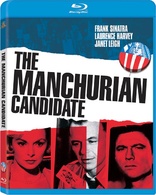
Movie rating
8.1 | / 10 |
Blu-ray rating
| Users | 4.1 | |
| Reviewer | 4.5 | |
| Overall | 4.1 |
Overview
The Manchurian Candidate (1962)
A U.S. Army hero returns to New York from Korea but has been mysteriously programmed by Communists to assassinate a presidential nominee. When his Army buddy becomes suspicious of the goings-on, he is on the trail to stop him.
Starring: Frank Sinatra, Laurence Harvey (I), Janet Leigh, Angela Lansbury, Henry SilvaNarrator: Paul Frees
Director: John Frankenheimer
| Drama | 100% |
| Psychological thriller | 24% |
| Mystery | Insignificant |
| Thriller | Insignificant |
Specifications
Video
Video codec: MPEG-4 AVC
Video resolution: 1080p
Aspect ratio: 1.75:1
Original aspect ratio: 1.85:1
Audio
English: DTS-HD Master Audio 5.1 (48kHz, 24-bit)
French: Dolby Digital 5.1 (640 kbps)
Spanish: Dolby Digital 2.0 Mono (256 kbps)
Subtitles
English SDH, French, Spanish
Discs
50GB Blu-ray Disc
Single disc (1 BD)
Playback
Region free
Review
Rating summary
| Movie | 4.5 | |
| Video | 3.5 | |
| Audio | 4.0 | |
| Extras | 3.5 | |
| Overall | 4.5 |
The Manchurian Candidate Blu-ray Movie Review
Raymond Shaw is the kindest, bravest, warmest, most wonderful human being I've ever known in my life.
Reviewed by Jeffrey Kauffman February 1, 2011There are probably only a handful of films whose titles have so entered the public lexicon that they become used as shorthand to describe issues or events. As recently as in the aftermath of the 2008 presidential election, pundits were tossing around The Manchurian Candidate to describe the so-called “Birthers”’ contention that Barack Obama hadn’t actually been born in the United States and was somehow “placed” here for nefarious purposes. John Frankenheimer’s 1962 political thriller seems oddly prescient on a number of levels, and not just with regard to our current political climate. In fact one of its salient plot points, which will be hard not to divulge in this review, seems to presage a lot of the turmoil which erupted across the sociopolitical landscape in the 1960’s. But perhaps even more than specific plot points, The Manchurian Candidate offered a paranoid scenario which aptly captured the slow awakening Americans were experiencing from their somewhat somnambulant 1950’s, an awakening that soon erupted into a decade or more of figurative screams, as society as a whole decided their “waking dream” was actually a nightmare. The Manchurian Candidate captures this surreal ambience with pitch perfect accuracy, playing the idealism of the halcyon Kennedy years against a growing awareness that all was not right with the world, and that things could soon go horribly, horribly awry.
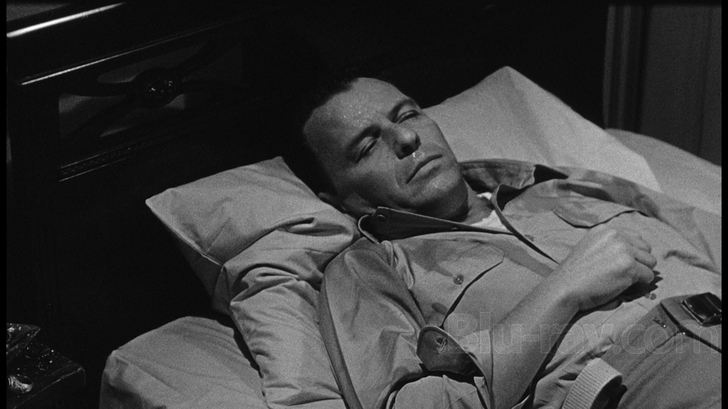
Writing about The Manchurian Candidate is a challenge, as the film contains a number of nice plot twists, back before people even thought about “twists” per se. Suffice it to say that Captain Bennett Marco (Frank Sinatra) slowly begins to realize that a mission he participated in during the Korean conflict, a mission which resulted in his Sergeant Raymond Shaw (Laurence Harvey) being awarded the Congressional Medal of Honor, may not have happened exactly the way he remembers, and that he, Shaw, and the rest of his men may have been subjected to some sort of mind control experiment. The Manchurian Candidate gives up at least a few of its secrets early on—at least enough to completely intrigue even the casual viewer—but where the film excels, and where George Axelrod’s adaptation of Richard Condon’s novel reaches such heights, is how the basic premise slowly twists back on itself, slowly peeling back layer after layer of a labyrinthine onion, where several major characters are not whom they seem to be. One of The Manchurian Candidate’s greatest achievements is that is weaves an aura of such suspicion and paranoia that most first time viewers won’t be entirely certain as to what is happening at the nail biting climax until it’s already accomplished.
The three best film adaptations of Condon novels, The Manchurian Candidate, Winter Kills and Prizzi’s Honor, all contain copious elements of intrigue, subterfuge and masked motives. The Manchurian Candidate and Winter Kills both share a certain neurotic, almost psychotic, take on America’s political process, and if Winter Kills mythologized the Kennedy assassination, The Manchurian Candidate seemed to prophesy it at least tangentially. This is a film of tamped down emotions fairly erupting in several major characters despite their best efforts to keep everything under control.
The Manchurian Candidate proved to be a career high of a certain sort for several of the performers. If Janet Leigh is largely wasted in a supporting romantic role, Sinatra has rarely been better as the troubled, tic-filled Marco, a man reduced to night sweats and an inability to do something as simple as light a cigarette as he strives to understand what his subconscious is desperately trying to tell him. If Laurence Harvey seems a bit too patrician and suave to properly portray an American war hero, his very European flavor actually plays to the character’s strength and helps undercut his buddies’ hypnotic uniform mantra that "Raymond Shaw is the kindest, bravest, warmest, most wonderful human being I've ever known in my life." Angela Lansbury simply owns the screen in her Academy Award nominated performance as Raymond’s ambitious harridan mother, one whose duplicitousness seemingly knows no bounds.
The film makes no bones in castigating in an almost—almost—humorous way the excesses of the McCarthy Era. Lansbury’s character has married a patsy Senator (James Gregory in a wonderfully buffoonish performance), and the two are ostensibly on a witch hunt to rid the United States of those damned Commies. Of course, nothing is as it seems in the film. Also superb in supporting roles are John McGiver as the sort of reasonable Senator we all wish worked for our state, and the gorgeous Leslie Parrish as his daughter, with whom Raymond falls in love against his Mother’s ardent—and perhaps amorous—wishes.
As William Friedkin enthuses in one of the Blu-ray’s supplements, there was no more important director in this era of American film than John Frankenheimer. Trained in the crucible of live television, Frankenheimer had a run of challenging films released in the late 1950’s and early 1960’s, several of which continue to be incredibly thought provoking to this day. If The Manchurian Candidate is occasionally a bit clumsy and clunky in its technical accomplishments (slightly misframed shots and the occasional out of focus moment), the film remains one of the most redolent early 1960’s political thrillers simply because so much of what it expresses seems completely relevant in the jaded 21st century. But Frankenheimer seemed drawn to unusually complex subject matter throughout at least his early career, as everything from the exploration of race and gangs in The Young Savages to the brilliant recasting of the Faust legend in Seconds admirably proves. Most importantly, Frankenheimer was always able to draw impressive performances out of actors, sometimes actors one wouldn’t exactly think of being well cast in any given role, as with Burt Lancaster in Birdman of Alcatraz or Rock Hudson in Seconds, and that particular proclivity is fully on display here in The Manchurian Candidate.
While there are certainly elements of shock and surprise throughout the film, it’s notable to realize just how restrained Frankenheimer’s directorial hand is, especially when the film could have devolved into Grand Guignol (and as he himself discusses in his very informative commentary track). While there are a couple of moments of explicit violence in the film, pay close attention to how Frankenheimer almost calmly builds terror and suspense slowly but surely, more often than not turning the camera away at various climactic moments, to let the viewers’ own minds and imaginations take them where explicit revelation couldn’t. It helps instill in the viewer the very sense of foreboding, suspicion and paranoia which fills virtually every frame of this masterpiece.
The Manchurian Candidate Blu-ray Movie, Video Quality 
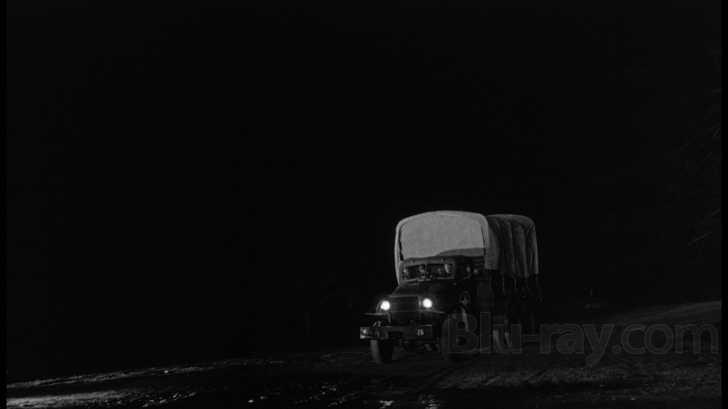
There's mostly good news about The Manchurian Candidate's AVC encoded 1080p transfer in 1.75:1 (very slight pillarboxing). The best thing about this new Blu-ray upgrade is the luscious black levels, so dark and oily you can virtually bathe in them. This aspect helps boost Lionel Lindon's cinematography to suitably somber levels. Contrast is on the whole also excellent. Sharpness and clarity are also substantially better than the most recent SD-DVD release. Where some viewers may have issues is with the film's at times overwhelming grain, which veers dangerously close to noise on a couple of nighttime shots. There's also a lack of consistency in sharpness from shot to shot, something which has been endemic to all previous home video releases of this title. Some segments of the film look stunningly detailed and wonderfully precise, while others are softer and suffer from occasional artifacting like shimmer and aliasing. Overall, however, this is certainly a better, cleaner looking transfer than we've seen on this film and most fans will be satisfied, if not jumping for joy.
The Manchurian Candidate Blu-ray Movie, Audio Quality 
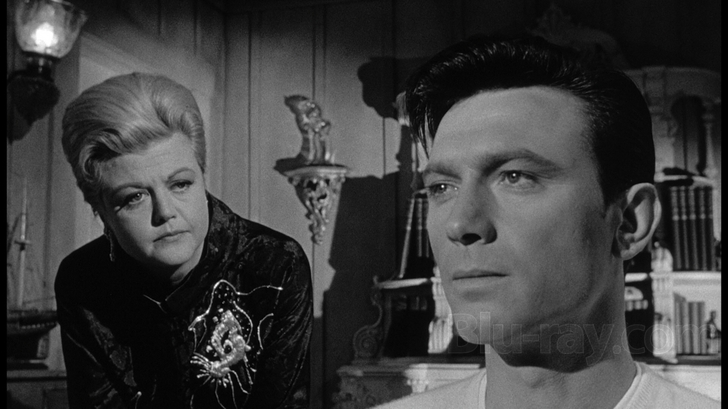
The Manchurian Candidate has been "tarted up," so to speak, with a new lossless DTS-HD Master Audio 5.1 mix. The good news here is there's nothing so horribly obvious and out of place it's going to drive anyone to distraction, but the lingering question remains: why? This is not a film that really cries out for a surround track, though the lossless audio certainly helps support the absolutely gorgeous, elegiac score by David Amram. Surround utilization is really fairly sporadic here. You'll here a helicopter pan and some side channel usage in the opening battle scene, and later in the kind of funny karate scene with Sinatra and Henry Silva various bashes and bams surround the listener, but otherwise this is a quiet, deliberate film based entirely on dialogue, usually between two people. There are some noticeable qualitative differences in some of the ADR here, notably the narration, which sounds just slightly boxy.
The Manchurian Candidate Blu-ray Movie, Special Features and Extras 
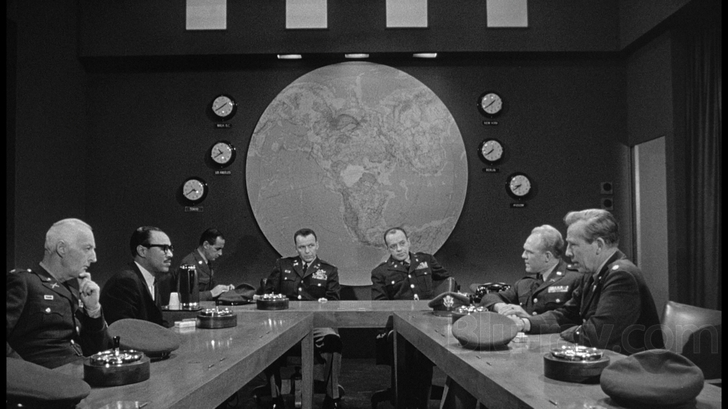
All of the supplements from the SD-DVD have been ported over to this new Blu-ray, plus you also get a couple of new ones:
- Feature Commentary by John Frankenheimer is understated and incredibly intelligent, just like the director himself, and is highly recommended.
- Interview with Frank Sinatra, George Axelrod and John Frankenheimer (SD; 7:59) is an interesting 1988 get together between the star, screenwriter and director.
- Queen of Diamonds (SD; 14:51) is an enjoyable interview with Angela Lansbury.
- A Little Solitaire (SD; 13:17) has Oscar winning director William Friedkin talking about the importance of the film and Frankenheimer.
- How to Get Shot (SD; 1:07) features Lansbury discussing how she prepared for the film's denouement, only what she says she does she doesn't do in the film, funnily enough.
- Phone Call (SD; 00:26) is a brief but funny outtake from the Friedkin interview.
- Theatrical Trailer
The Manchurian Candidate Blu-ray Movie, Overall Score and Recommendation 
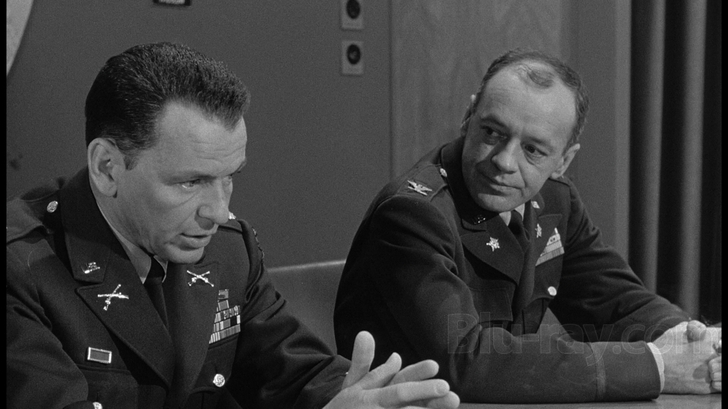
There's a reason why The Manchurian Candidate is so well remembered now virtually 50 years after its initial release. This is a breathtaking piece of audacious filmmaking which features a compelling subject matter and some extremely good performances. This new Blu-ray may not be the be-all end-all this film's ardent fan base might have hoped for, but it's a substantial upgrade. The film is an enduring masterpiece, however, and easily receives my Highest Recommendation.
Other editions
The Manchurian Candidate: Other Editions
Similar titles
Similar titles you might also like

3 Days of the Condor 4K
1975

Tinker Tailor Soldier Spy 4K
2011

Child 44
2014

House of Cards Trilogy
House of Cards / To Play the King / The Final Cut
1990-1995

The Manchurian Candidate 4K
20th Anniversary Edition
2004

Shadow Dancer
2012

North by Northwest
1959

The Ghost Writer
2010

The Spy Who Came in from the Cold
1965

Blow Out 4K
1981

The Tailor of Panama
2001

Marnie 4K
1964

Syriana
2005

The Prisoner: The Complete Series
1968

Seven Days in May
Warner Archive Collection
1964

Foreign Correspondent
1940

Sunflower
I girasoli
1970

The Ipcress File
1965

Winter Kills
1979

The Mind Benders
1963

